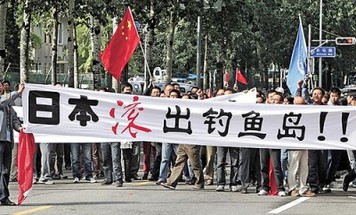Year 2010
September 7 While in waters north of the Senkaku/Diaoyu Islands, Zhan Qixiong's 14-member fishing trawler ignores warning from Japanese patrol vessels to leave the area. Japanese patrol asks to inspect the boat, and in an attempt to evade inspection, Mr. Zhan's boat collides with two of the Japanese patrol vessels. Japan Coast Guard captures Mr. Zhan and his crew.
September 11 Chinese foreign minister Yang Jiechi demands immediate release of Mr. Zhan and his crew.
September 14 Japan releases the 14 crew members but detain Mr. Zhan.
September 20 China threatens to take action against Japan if they do not let Mr. Zhan go. Foreign Ministry spokesman Ma Zhaoxu says that “if the Japanese side clings obstinately to its course, making mistake upon mistake, then China will take strong countermeasures and Japan will bear all the consequences."
September 22 Chinese custom officials halts shipments of rare earth minerals to Japan, though a Chinese Commerce Ministry spokesman Chen Rongkai denies that any embargo has been imposed.
September 23 China detains four Japanese citizens at a military base near the city of Shijiazhuang about 190 miles southwest of Beijing, on account of videotaping military installations.
September 24 Japan frees Mr. Zhan.
September 25 Just as this issue seems to come to a close, Beijing demands an apology and compensation, and Tokyo refuses. China continues to hold the four Japanese nationals arrested two days ago.
September 26 No apology from Tokyo, only a demand for reparations to the two coast guard ships damaged by the trawler.
October 28 The export embargo on rare earth minerals to Japan is lifted
September 7 While in waters north of the Senkaku/Diaoyu Islands, Zhan Qixiong's 14-member fishing trawler ignores warning from Japanese patrol vessels to leave the area. Japanese patrol asks to inspect the boat, and in an attempt to evade inspection, Mr. Zhan's boat collides with two of the Japanese patrol vessels. Japan Coast Guard captures Mr. Zhan and his crew.
September 11 Chinese foreign minister Yang Jiechi demands immediate release of Mr. Zhan and his crew.
September 14 Japan releases the 14 crew members but detain Mr. Zhan.
September 20 China threatens to take action against Japan if they do not let Mr. Zhan go. Foreign Ministry spokesman Ma Zhaoxu says that “if the Japanese side clings obstinately to its course, making mistake upon mistake, then China will take strong countermeasures and Japan will bear all the consequences."
September 22 Chinese custom officials halts shipments of rare earth minerals to Japan, though a Chinese Commerce Ministry spokesman Chen Rongkai denies that any embargo has been imposed.
September 23 China detains four Japanese citizens at a military base near the city of Shijiazhuang about 190 miles southwest of Beijing, on account of videotaping military installations.
September 24 Japan frees Mr. Zhan.
September 25 Just as this issue seems to come to a close, Beijing demands an apology and compensation, and Tokyo refuses. China continues to hold the four Japanese nationals arrested two days ago.
September 26 No apology from Tokyo, only a demand for reparations to the two coast guard ships damaged by the trawler.
October 28 The export embargo on rare earth minerals to Japan is lifted
Analysis of events
In the past, when Chinese boats came too close to the islands, Japan Coast Guard would simply chase them away. This time, though, it set off an angry outcry from the Chinese and a series of diplomatic rallying when it captured the fishing captain and fourteen members of his crew. China immediately reacted by threatening to tighten economic sanctions and suspended relations between provincial and central government officials and their Japanese counterparts, ceasing talks aimed at expanding aviation routes and joint development of the gas fields in the East China Sea. China has a monopoly on the rare earth industry, mining 93% of he world's supply of rare earth minerals and over 99% of some of the world's most prized rare earths. Japan is heavily reliant on these natural resources from China to produce a wide range of industrial products such as solar panel glass, steering control motors, batteries, computer display screens, catalytic converters and magnets. Additionally, Chinese companies canceled tours to Japan by 10000 tourists. China is Japan's biggest trading partner and a prolonged forestall in trading and business exchanges would have had long-term repercussions on the Japanese economy.
The arrest of the four Japanese nationals was widely seen as a bargaining tool for Mr. Zhan's release. If it was, it worked; Mr. Zhan was released one day later. The decision to release him was received with much criticism from right-wing groups in Japan, who say that such a move will falsely boost China's ego and send the misconstrued signal that Japan has lost its political backbone. Beijing's demand for an official apology and compensation pushed the issue to a more complex level. While Japan faced pressure from its people to stand up against an increasingly aggressive and assertive neighbor, it did not want to rub China in the wrong way and wanted to avoid the situation from flaring up again. With these factors in mind, the Japanese Foreign Ministry issued a rejection to the demand: “There is no territorial issue that needs to be resolved. The demand by the Chinese side for apology and compensation is completely groundless and is utterly unacceptable.” The fact that the rejection did not come directly from a higher-ranking cabinet official suggested that Tokyo wanted to prevent another diplomatic showdown, but at the same time the statement's blunt tone indicated that Tokyo sought to appease domestic concern.
To know more about the controversy, or for any inquiries about the website, contact the author at [email protected]
